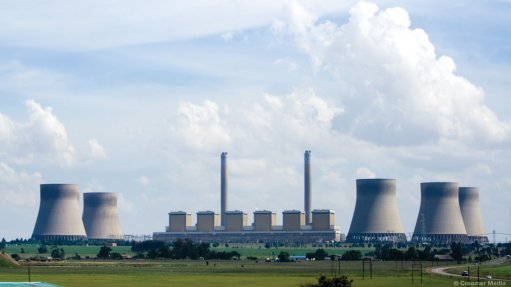
Photo by: Duane Daws
State-owned electricity producer Eskom reported on Tuesday that a five-point recovery plan was being introduced in a bid to place its underperforming power station fleet on a “sustainable path”.
However, Eskom cautioned that an additional 7 400 MW of capacity would be required this year to provide the cushion it required to enable it to deal with its maintenance requirement – a maintenance-capacity shortfall that would persist until 2019, but at a lower level as new capacity was introduced.
Interim CEO Collin Matjila presented the generation recovery plan to the Parliamentary Portfolio Committees on Energy and Public Enterprises, highlighting that 60% of its power stations were older than their recommended design life of 30 years.
As a consequence, there had been an increase in unplanned and mechanical-maintenance failures. In addition, outages needed to endure for longer periods, were more costly to implement and required specialist-engineering skills to complete.
Eskom indicated that the recovery plan was premised on recommitting to and delivering on Eskom’s ‘80-10-10’ operating model, which implied 80% plant availability, 10% planned outages and 10% unplanned events across a period of a year. In 2013/14, the group’s unplanned capacity loss factor rose to around 11%, while its energy availability factor fell to 75.1%.
The intervention would also focus on embedding good practices, from adhering strictly to standard operating procedures to improved online maintenance. “Visible, aligned and felt” leadership, as well as hands-on oversight and mentorship were also stressed, along with plans to more fully leverage demand- and supply-side opportunities.
Eskom also outlined various actions it would be taking over the next five years to improve sustainability, with the next 18-month period dedicated to stabilising “people, plant and processes”.
Addressing the same meeting, Public Enterprises Minister Lynne Brown said she had instructed the Eskom board to “explore and urgently implement measures to improve performance of areas that have experienced significant challenges, in particular power stations”.
This instruction followed on from her appeal in mid-July for “extraordinary” steps to be taken to deal with the unsatisfactory performance of the State-owned utility’s generation fleet.
It also came after it was confirmed that former mining executive and Energy Intensive User Group chairperson Mike Rossouw had been appointed on a one-year assignment to initially focus on the finding remedies to the performance problems being experienced at the power stations.
However, Eskom’s presentation also made it apparent that the turnaround could take some time, particularly in light of the utility’s admission that there had been “over 15 years of under expenditure” on a fleet basis.
Adding to the turnaround concern was the utility’s current financial difficulties, which were again aired with lawmakers. Eskom said it faced a near-term liquidity challenge, while forecasting that it would become cash flow negative by June 2015.
The utility was investigating alternative sources of funding, including additional borrowing options, but it reiterated that financial sustainability could not be achieved through efficiencies and savings alone, as it faced a R225-billion revenue shortfall and the prospect of R47-billion in lower-than-expected sales.
Brown said an intergovernmental task team, comprising the Department of Public Enterprises, the Department of Energy the National Treasury, was working with Eskom and the National Energy Regulator of South Africa “to formulate a solution to the immediate challenges that Eskom is facing”.
“A draft report with options has been shared with us, and we are going to be receiving the final proposal soon after which we will take to this Cabinet subcommittee and Cabinet ideally before end of September,” Brown reported.